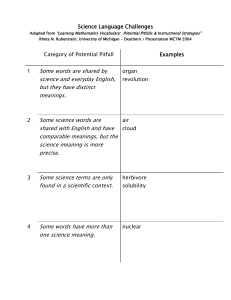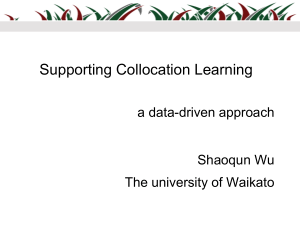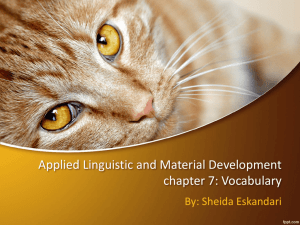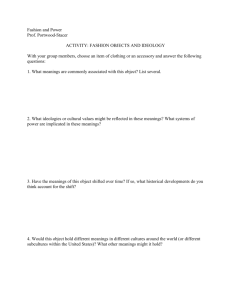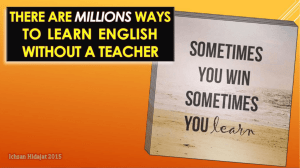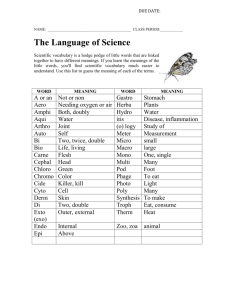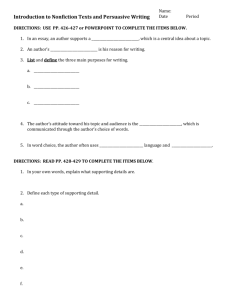WA ESOL: October 24, 2009 - California State University, Fullerton
advertisement
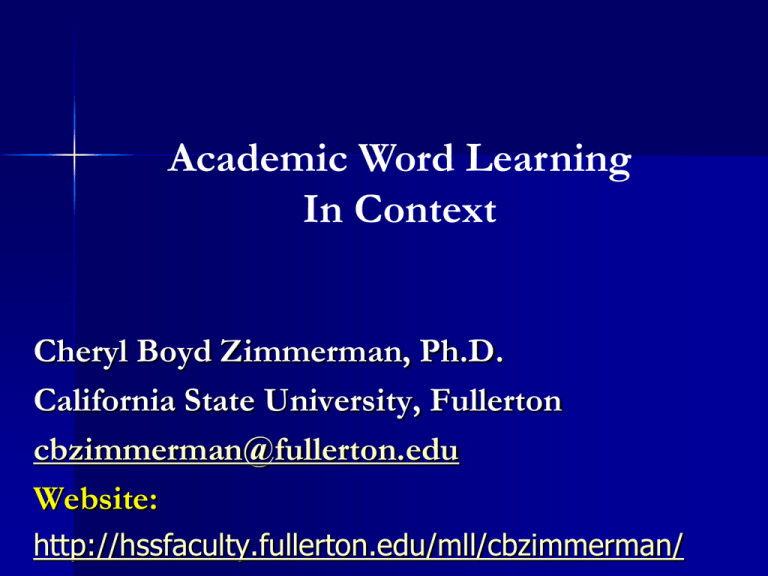
Academic Word Learning In Context Cheryl Boyd Zimmerman, Ph.D. California State University, Fullerton cbzimmerman@fullerton.edu Website: http://hssfaculty.fullerton.edu/mll/cbzimmerman/ Two 15-year olds from London were asked which laws they think should continue and which ones should not. I dunno, there’s times when I think there are a few laws I’d like to stop but. . .don’t know any I’d like to bring in. I don’t think I’d introduce many new ones but I would abolish quite a few. Corson, 1985, p. 77 Different Perspectives of Academic Vocabulary 1. English words of Greek and Latin origin 2. Words needed in the classroom (Burke, 3. Content area terms that build up students’ background knowledge. (Corson, 1985) 2003) (Marzano & Pickering, 2005) 4. Academic vocabulary includes (a) words that refer to thinking and communicating, (b) words that are common across subjects but hold different meanings depending on the subject, and (c) words that have everyday meanings that are different from the discipline-specific meanings. Word Generation: http://wordgeneration.org/index.html 5. Words identified by word frequency counts in academic materials: UWL – Xue & Nation (1984) and AWL - Coxhead, A. (2000). Reading and Academic Vocabulary: A Reciprocal Relationship Koda, 2005 The Beginner’s Paradox: You need words in order to read. You need to read in order to learn words. Laufer, 1991, Nation, 1990 Effective Vocabulary Instruction I. Uses high interest materials; the contexts are rich and the language is authentic. II. Equips learners to notice the details of word use III. Includes many opportunities to use words in learner-centered interaction. High Interest Materials The List Approach reduce associate capture release exhale The Interest Approach To reduce bad breath usually associated with garlic or onions, do not eat them at the same time with fatty foods. If you do, the fat will capture their smell and release it each time you exhale. 1a. The Role of High Interest Materials in Inside Reading Articles Sample Topics: – Level 1 Science: Solving a Crime with Science: A True Story – Level 2 Engineering: Coober Pedy: Really Down Under – Level 3 Psychology: Child Prodigies – Level 4 Physiology: Were Humans Born to Run? 1b. The Role of High Interest Materials in Inside Reading Activities Level 3 , p. 124 Complete the sentences about Albert Einstein using the target vocabulary in the box. concentrated intelligence a. considerably pursued enormous revealed factor normal The ___________ __________ of Albert Einstein is now very large mental ability well known, but it wasn’t so obvious when he was young. concentrated factor revealed b. considerably intelligence normal enormous pursued Though it is ________ for children to speak before the usual c. age of 3, Einstein didn’t say his first words until he was nearly 4. . . One _______ that led to his interest in physics sprang thing from an incident that occurred when he was only five. His uncles showed him a compass. From then on, Einstein ________ physics with great passion. tried to understand B. The Details of Word Use: What does it mean to Know a Word? 3. 4. 1. Meaning (s) 2. Collocations Grammatical Features Register and Appropriateness B. The Details of Word Use: What does it mean to Know a Word? 3. 4. 1. Meaning (s) 2. Collocations Grammatical Features Register and Appropriateness 1. Meaning Use authentic context to demonstrate a word’s range of meaning and multiple meanings Example: objective Inside Reading, Level 1, p. 128: “During his 12th century travels through China, Marco Polo supposedly saw people using eyeglasses. . . . . .The objective of the earliest lenses was to help people see things that were close up so they could do tasks like carving or sewing. . . . Inside Reading : Level 1, p. 130 (continued) Target word: objective Match each game with its objective. Then tell a partner how the two ideas are related. 1. Soccer a. to hit a ball over a net 2. Golf B. to throw a ball into a hoop 3. Tennis c. to hit a ball into a hole 4. Golf d. to kick a ball into a goal 1b. Multiple Meanings Inside Reading : Level 1, p. 131 Target word: objective Read these sentences. Cross out subjective words so that the statements become objective reports of news events. 1. The beloved prime minister gave a brilliant 30-minute speech yesterday. Continued 2. I’m angry that taxpayers will face yet another large, unwelcome tax increase. 3. The audience applauded wildly after the best performance I’ve ever seen. 4. I’m happy to report that the awful man got what he deserved and was arrested. Still more about Meaning Burgmeier, 2009: Level 1, p. 3 Target word: alteration (and its word family) Article: “The History of Bicycles” “Bicycles first appeared in Scotland in the early 1800s and were called velocipedes. . . Around 1870 (Americans) began building velocipedes. . .. But they made the frameworks from hollow tubes. . .This alteration made (them) much lighter.” Meaning Burgmeier, 2009: Level 1, p. 3 Work with a partner. Imagine that you have borrowed a friend’s bicycle for the weekend. Which things can you alter? Which things cannot be altered on a borrowed bicycle? Write A for each item that is alterable. Write U for each item is unalterable. Word Level Practice (cont) The The The The The The The The speed of the bicycle color of the framework height of the seat design of the bicycle size of the wheels direction the bicycle turns speed that the wheels turn mirrors on the handlebars Still more about Meaning Burgmeier, 2009: Level 1, p. 118 D. An annual event is one that occurs once a year or is repeated every year. Which of these occur annually? Spring New Year’s Day A full moon your birthday a wedding October new classes animal migration family gatherings Still more about Meaning Level 1 1. 2. 3. Unit 4, p. 48 military and Unit 4, p. 49 Unit 5, p. 67 positive) 4. (contrast the meanings of civil). (Use the term ambiguity) (Multiple meanings for Unit 5, p. 68 (Positive and negative meaning s for exploit.) 2. Collocation Zwier, 2009: Level 2, p. 22 Article: “Power of Branding” Answer these questions. . .using the verb in parentheses. Be sure to use a preposition that collocates with it. Refer to Reading 1 for information. Compare answers with a partner. Presenting Words in Context Collocation: Sentence Level 1. Why are symbols like the rolls Royce badge or the Harley-Davidson logo so powerful? (register) 2. Why does a weak brand harm the sales of a product? (equate) 3. Why would a stronger brand help the shoe company mentioned in Paragraph 1 of the reading? (convert) Still more about Collocation Level 1 1. Unit 2, p. 21, (collocations used with priority) . 2. Unit 2, p. 28 (collocations used with implement - exercises G and H) 3. Grammar Zwier, 2009: Level 2, p. 22 Target word: Despite (and its word family) Article: “The New Megalopolis” Practice: Write four sentences featuring information you have learned about cities. Use the words in parentheses in your sentences. (despite; despite the fact that; in spite of/in spite of the fact that.) Still more about Grammar Level 1 1. Unit 1, p. 13 (paraphrase practice using the word forms of individual) 2. Unit 3, p. 35 (rewriting headlines using the word forms of export) 3. Unit 3, p. 42 (interpreting a chart, using the word forms of administer) 4. Register and Appropriateness Inside Reading, Level 3, p. 125 Many academic words are also considered formal words. Which of the target words in this unit are more formal synonyms of these informal words? Be sure to use the right forms of the target words. challenge reveal pursue intelligent enormous concentrate technology resource Informal 1. Smart 2. To use 3. Huge 4. Uncover 5. Difficulty factor environment considerable utilize normal focus expert Formal ___________ ___________ ___________ ___________ ___________ Still more about Register and Appropriateness Level 1 1. Unit 6, p. 81 (authentic practice with informal use of the forms of technical) Writing and Discussion Topics Writing and Discussion Topics Zwier, 2009, Level 2, p. 28 Topic: The Power of Branding 1. Reading 2 mentions young people who express youthful rebellion by starting companies. Do you think Reading 2 really describes a new phenomenon or not? Explain your answer and use specific examples to support it. Level 1 Solving a Crime with Science: A True Story Writing and Discussion Topics authority contrary instance panel tape conclude detect logic site technical Consult establish motive specific 1. Find an article in a newspaper or news magazine that describes a crime. Describe what happened, using as many target words from this unit as possible. Level 1 Writing and Discussion Topics (continued) authority contrary instance panel tape conclude detect logic site technical Consult establish motive specific 2. In some countries, the media are given access to information about crimes as details become available. In other countries, the media may not publish or broadcast information about a crime investigation. Which do you think is the better way? Why? Level 3 Writing and Discussion Topics ( p. 128) challenge reveal pursue intelligence enormous concentrate technology resource utilize factor environment considerable normal focus expert 1. Interests and abilities seem to run in some families. Is this the result of environmental or hereditary factors? Comment on this using examples from your own experience and from the readings and exercises in this unit. References Burke, J. (2003). The English teacher’s companion. Portsmouth, NH: Boynton/Cook Heinemann. Corson, D. (1985). The lexical bar. Oxford: Pergamon Press. Coxhead, A. (2000). A new academic word list. TESOL Quarterly 34, 213-238. Koda, K. (2005). Insights into second language reading. Cambridge: Cambridge University Press. Laufer, B. (1992). Reading in a foreign language: How does L2 lexical knowledge interact with the reader’s general academic ability. Journal of Research in Reading. 152, 95-103. Marzano, R., & Pickering, D. (2005). Building academic vocabulary: Teacher's manual. Alexandria, VA: Association for Supervision & Curriculum Development. Nation, ISP, (1990), Teaching and learning vocabulary. Boston: Heinle & Heinle. Word Generation: http://wordgeneration.org/index.html Xue, Guoyi & Nation, ISP (1984). A university word list. Language Learning and Communication, 3, 215-219.
![Word Study [1 class hour]](http://s3.studylib.net/store/data/007905774_2-53b71d303720cf6608aea934a43e9f05-300x300.png)
